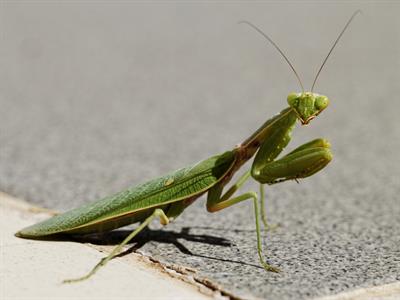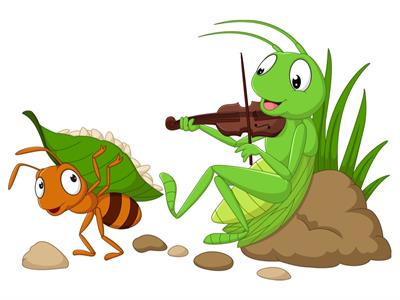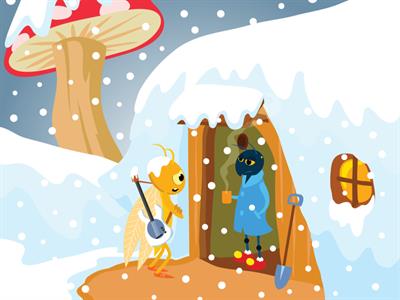PDF chapter test TRY NOW
The poem talks about a cricket that was young and not so wise. A cricket is an insect that looks similar to a grasshopper. The fable clearly starts off by describing the cricket as silly. This gives a foreshadow of what the ending might be, that the cricket might perform a silly action, producing consequences. He had the habit of singing during happy times and is accustomed to it. This shows that he is not used to the sad times. He does not accept that life offers both happiness and sadness together. He is only happy when life offers good things and has no thoughts about the future.

A cricket
During the spring and summer seasons, the warm sunny weather allowed lush green vegetation, and all living beings got adequate food and water. Summer and spring is the season of growth and warmth. Most animals gather food during this season and hibernate during the winter. Winter is a season where farmlands are covered in snow and there is stunted growth. It is also because of the body temperature of certain animals and insects that they rest in winter with the accumulated food. The poem starts with the description of a very fresh summer with all things chirpy and positive, with the cricket being in its happy place. But the tone shifts in the third line when there is a seasonal change.

Plants covered in snow during winter
In contrast to summer, during the winter months - the whole place was covered with snow. There were no plants, leaves or flowers in sight. Therefore the cricket found it hard to find food at such times, as its main source of food is plants and leaves. The cricket which enjoyed during the active warm months failed to store for the future. He opened the cupboard and found it empty - there was not a small piece of food to be found, because he had not saved any food. Winter had started, and now only the cricket realised that he had not stored food. He wondered what would happen to him because he did not have any food.
The cricket had not saved any food for the future, and he wondered what would happen to him if he did not have food. He would have to starve without food if he did not do anything now. The ant was literally starving because of the lack of food. Since the food situation had hit the entire place, it is referred to as a famine situation. The ant saw that he was in a very helpless situation. He was soaked, wet and shaking because of the extreme cold weather.

Ants carrying rice grain
When one is in a helpless and pathetic situation, they tend to lose their ego and mustered the courage. The world is designed in such a way that it operates in a way that each person helps the one in need. But the ant was the sole reason for being in this situation. He, therefore, gathered courage from the fear of being without food; he started his journey to visit the ant and ask his help. The cricket wanted to borrow from the ant and repay it in the future (tomorrow refers to the future, not the next day).
The ant is referred to as miserly only from the point of view of the cricket, as the ant hoards up food in a lesser amount and daily basis. The cricket who had never done any of this calls the ant miserly, yet asks help from the ant. Miser refers to people saving a lot and spending very little. It can be given a positive meaning here, to praise the ant's quality of thinking about the future and preserving food for the cold days. He is in search of two things, predominantly in the winter season.
- A staying place for the winter to protect him from the rain.
- A mouthful of grain (the quantity of grain that is sufficient for insects like cricket).
The cricket asks the ant for shelter, in spite of knowing that ants live in groups in small holes, which would not fit in the cricket. Also, the cricket eats the plant and plant-based stuff predominantly but knows that ants only hoard rice grains. This shows that one does not have a choice and has to cut down on specifics if they fail to do the work on time. He knows this fact and is completely in the ant's mercy.
The cricket went to the ant and asked for help. The ant said he was the cricket's servant and friend, meaning that he would help him if required. But the ant also said that ants don't borrow or lend anything. The ant further asked the cricket what he had been doing when the weather was warm enough for him to work hard and save food. The cricket replied that he was very happy when nature looked good and bright. He added that he sang all day and night, out of happiness.

The cricket was singing songs whilst the ant was working
Here the poet refers to the mockery made by the ant as it asks unbelievably if the cricket had really wasted time singing. The ant mocked the cricket because the ant was worked hard during the summer months to relax and have food during winter, whereas the cricket had sung songs all day during summer and now came to the ant for help. This also refers to the poet mocking lazy people. We should always think of our future and save according to our needs. When we have money, we should not spend everything; we should save for the hard days.
If we have a valid reason for not saving for the future, others may show pity on us and help us out of a difficult situation; but if we enjoy happily instead of working hard, nobody will come forward to help us. The summer and winter may also refer to our young and old age - if we work hard during our young years and save wisely, we can live happily during the old age without asking for help from anyone.
Generally, we feel like helping someone only when they are truly helpless and has put in all the efforts. If the little help offered could add to the effort they have put in, it would come as an aid. But here, the ant realised that it would be taken advantage of, and the cricket brought it on himself. He, therefore, refused to help. The ant sarcastically says that the cricket can go dance the winter away if he is feeling hungry, just like how he had done in summer, showing that fun alone is not enough to lead life. He quickly closed the small opening in the door and shut the cricket out of his house. The poor cricket had no other choice but to leave the place. The ant is also very cautious, as it knows where to help and where not to. 

The ant turns down the cricket at the doorstep
The poet says people think of this story as a fable (an imaginary story), but he feels it could have even really happened. The moral of the story is very true, that it can happen actually in real life too. He refers to the cricket in the poem as a four-legged cricket and humans as two-legged crickets. If we are silly enough like the cricket, we will also end up starved and disappointed. We should always think ahead and save for the future. We should never think that we can get paid without hard work. Even if we get manage to, it would be of no use. We must also never think of taking advantage of a friend's offer to help. One must work for oneself and not rely on others.
